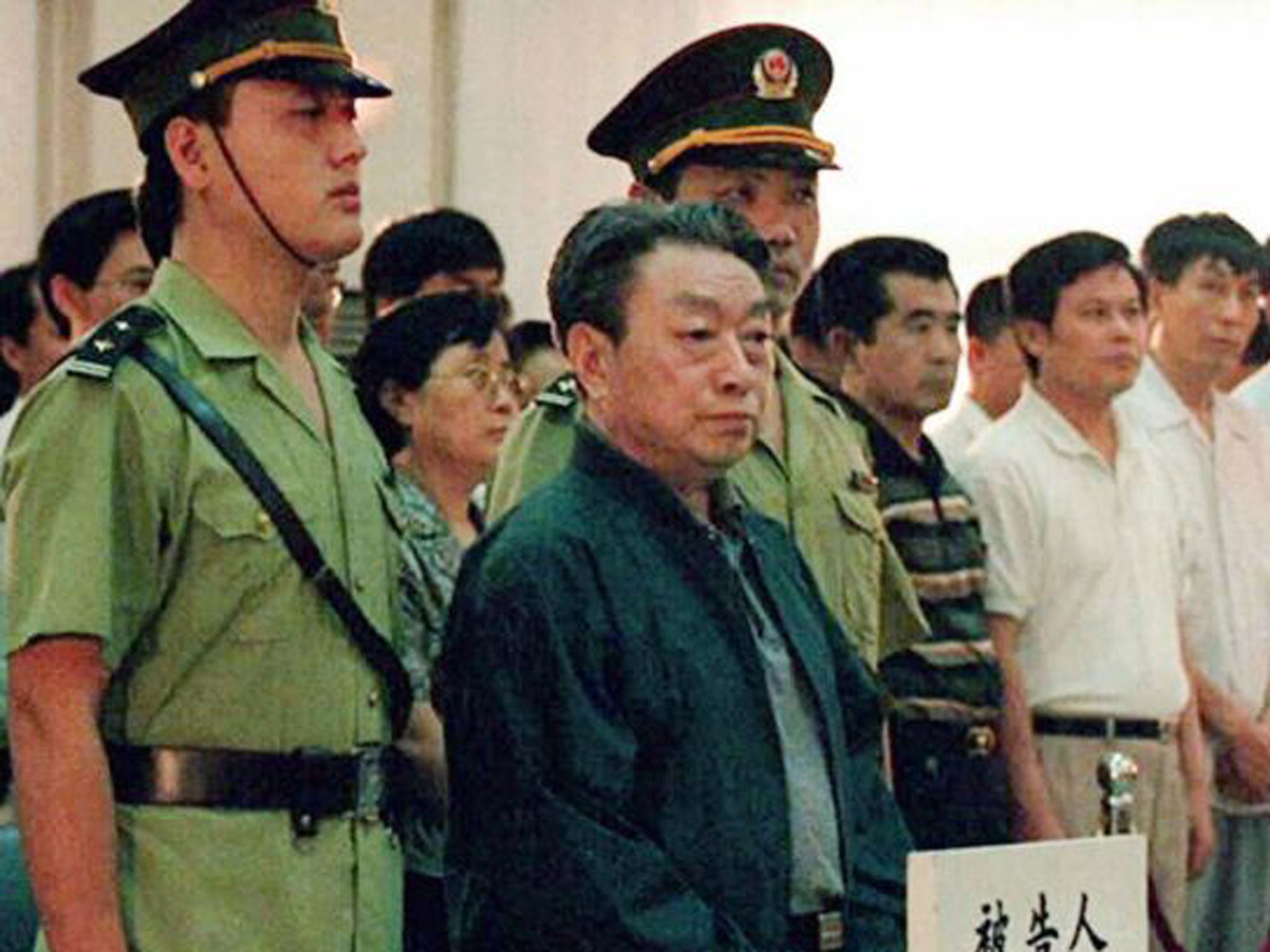Chen Xitong: Disgraced former mayor of Beijing
'A regrettable tragedy that could have been avoided,' he later said of the 1989 Tiananmen Square massacre

Chen Xitong was the disgraced former mayor of Beijing who died two days short of the 24th anniversary of the brutal 1989 Tiananmen Square massacre by the Chinese military which he had promoted and publicly supported. He was reportedly suffering from cancer of the colon.
Shortly after his promotion to party secretary of Beijing and a seat on the Party’s elite Politburo in 1992, in recognition for his support during the crisis, Chen was purged and sentenced to 16 years in prison on charges of corruption and dereliction of duty. He was accused of accepting bribes and the misappropriation of $2 billion of public funds to build luxury villas, where he threw lavish parties and took his mistresses, who were also showered with gifts and properties.
In sentencing him in 1998, a Beijing court ruled that Chen pursued a “corrupt and decadent life”. Chen’s fall from power and that of another convicted official, former Shanghai party Chief Chen Liangyu, marked two of the highest-level political scandals and prosecutions since Communist China’s founding in 1949, until last year’s revelation of the widespread corruption of former Chongqing party boss and leading Politburo member Bo Xilai.
The Tiananmen Square pro-democracy demonstrations, which had crippled the Chinese capital for weeks, were triggered in April 1989 by the death of former Communist Party General Secretary, Hu Yaobang, a liberal reformer, who was deposed after losing a power struggle with hardliners over the direction of political and economic reform. University students marched and gathered in Tiananmen Square to mourn Hu, but also voiced grievances against inflation, limited career prospects and corruption within the party elite. They called for government accountability, freedom of the press, freedom of speech and the restoration of workers’ control over industry. At the height of the protests, about a million people assembled.
Support for the students spread throughout China and by mid-May there were protests in 400 cities. The Chinese government condemned the protests as a “counter-revolutionary riot”. In his 2009 memoir Prisoner of the State the late Communist Party general secretary Zhao Ziyang wrote that the decision to use the military against peaceful protesters in Tiananmen Square could have been avoided but for the scheming of die-hard conservatives such as Chen, Prime Minister Li Peng and vice-premier Yao Yilin, and Deng Xiaoping’s paranoia about losing power. They convinced him that the protests were a plot that would jeopardise his position and that of the party.
Zhao believed that Chen and other party hardliners disregarded the fact that the protests had started to calm down, and by promoting a ruthless hard-line response Chen played a critical role in prompting Deng’s harsh response. Martial law was declared on 20 May and nearly 300,000 troops were mobilised.
On 3-4 June, tanks and troops with assault rifles were sent in to clear the square and caused thousands of casualties among the unarmed protesters trying to block their advance. Beijing defended its decision to send in the military, but due to the lack of information from the authorities, many aspects of the events, including the official death toll, remain unconfirmed; estimates of the dead range from several hundred to many thousands. In the aftermath the government conducted widespread arrests of protesters and their supporters.
In an official report, Chen defended the military action and blamed former Premier Zhao, a moderate, for splitting the party and supporting the protests. In 2011, however, a book entitled Conversations with Chen Xitong by Yao Jianfu, attempted to rewrite history and shift blame from Chen, who claimed that the crackdown was “a regrettable tragedy that could have been avoided… Nobody would have died if it had been handled properly.” He claimed to have been simply the mouthpiece for the government when he was forced to read aloud the official account of the incident for public consumption.
Chen Xitong was born in south-west Sichuan province in 1930 and raised by his widowed mother. A diligent student, Chen won a scholarship to study Chinese literature at Peking University, joining the Communist Party in 1949 months after the People’s Republic of China was founded. He married his university professor’s daughter and had two sons.
Chen rose through Party ranks, serving as vice-party secretary of Beijing’s Changping County and becoming the city’s mayor in 1983. He was widely viewed as an effective administrator in a time of rapid growth. The troubles he encountered next had more to do with power politics than with his corrupt ways; his corruption was nothing new and was viewed as typical of high-level officials.
Chen’s demise started in 1992 when he criticised Jiang Zemin, who had been installed as Zhao’s replacement as General Secretary of the Communist Party in the aftermath of Tiananmen. Jiang decided to destroy Chen; corruption charges served as a handy cudgel.
By May 2006 Chen had reportedly been released from prison on medical parole for cancer treatment. He looked set to fade into the annals of Chinese political history but for the publication of his interviews. The events that took place on Tiananmen Square and its surrounding streets remain as taboo as ever, a reminder that there has been little, if any, political reform over the past 24 years.
Chen Xitong, politician: born Sichuan Province, China 10 June 1930; married (two sons); died Beijing 2 June 2013.
Join our commenting forum
Join thought-provoking conversations, follow other Independent readers and see their replies
Comments
Bookmark popover
Removed from bookmarks